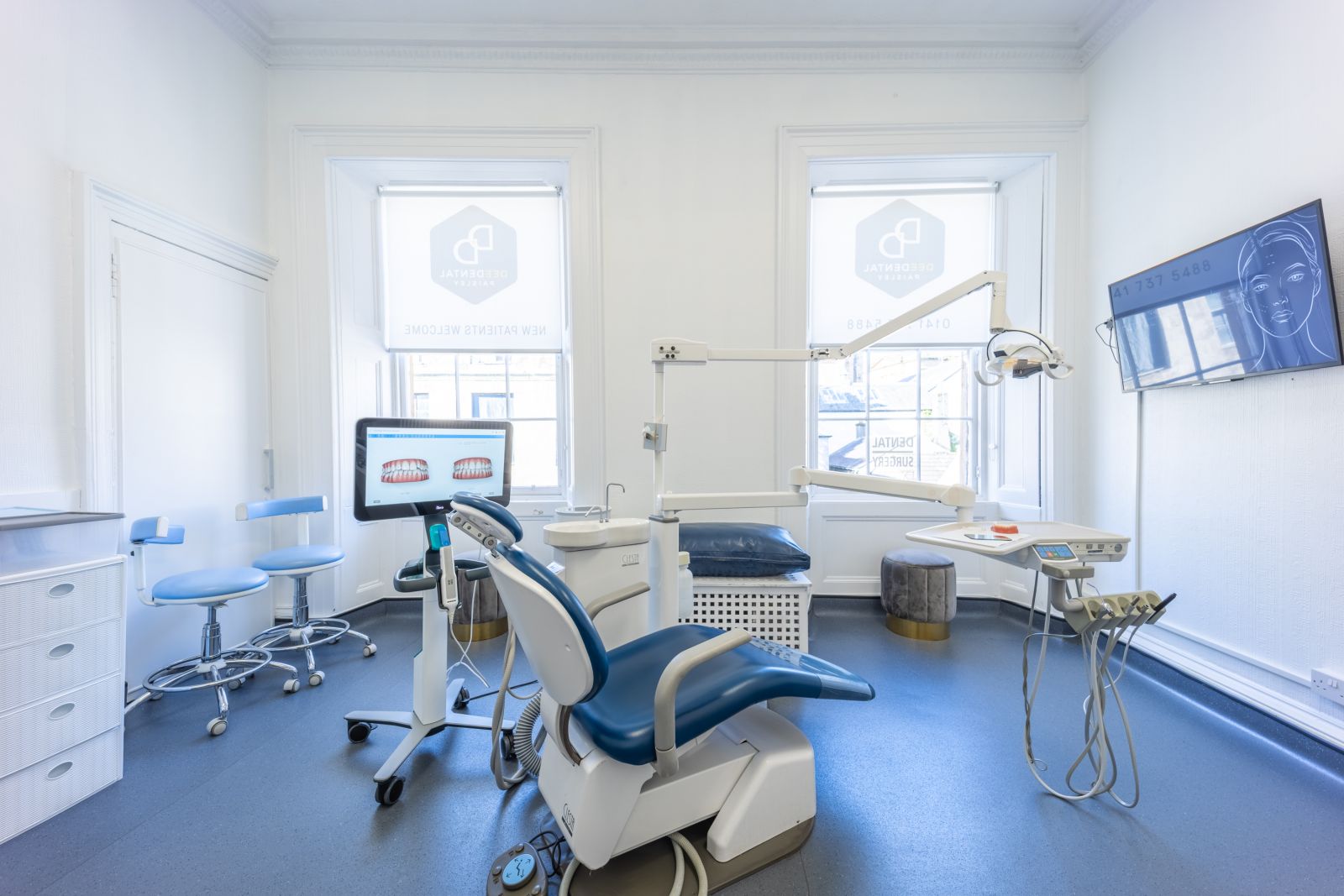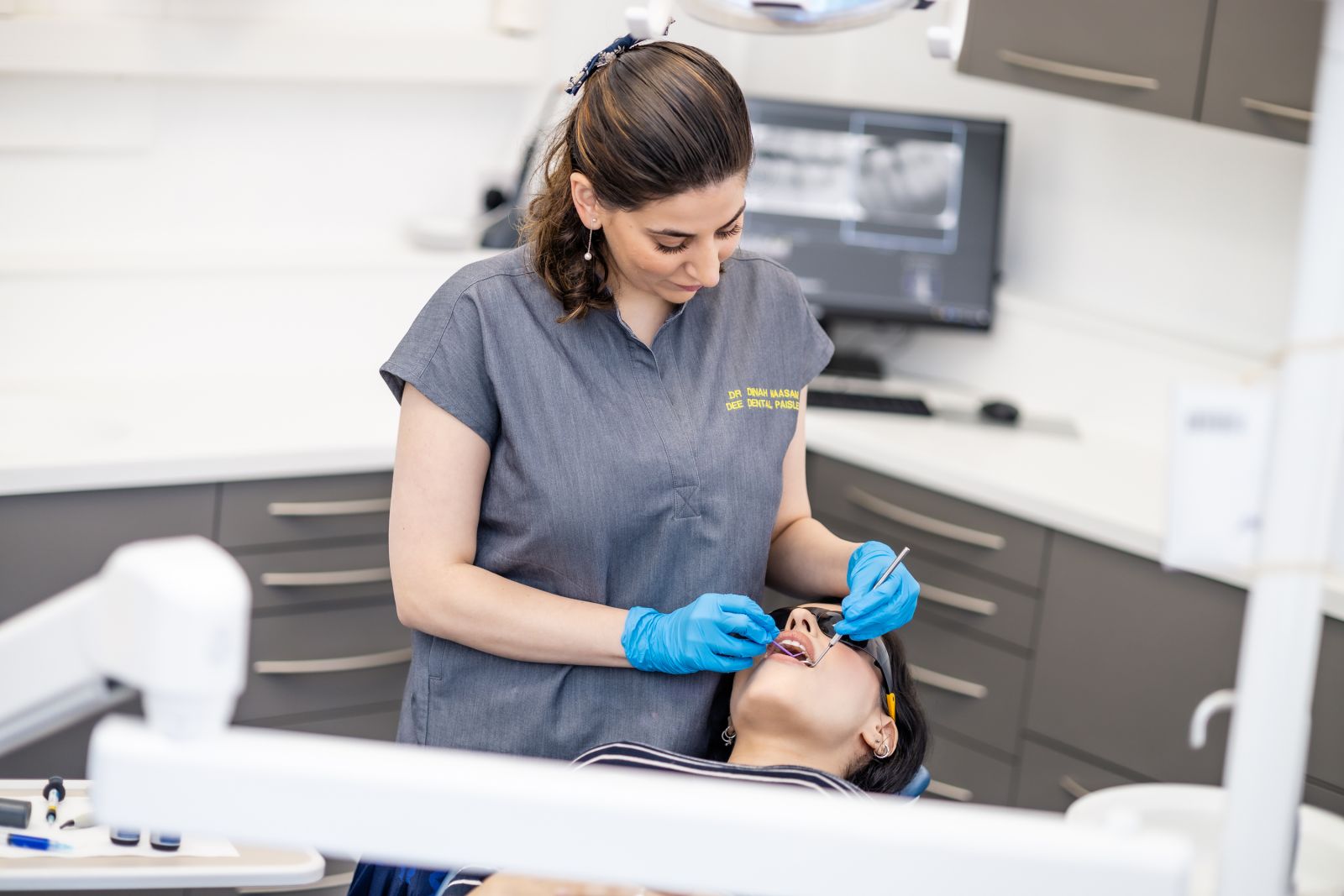Gum Disease Treatment Glasgow & Paisley
Are you suffering from bleeding, inflamed gums or persistent bad breath? These are signs of gum disease, a common issue that usually results from poor oral hygiene.
Gum disease causes inflammation, infection, and soreness in the gums, which, if left untreated, can lead to bad breath, bleeding, and even the loss of teeth.
The encouraging news is that gum disease, also known as Periodontal disease, can be effectively prevented through proper hygiene practices such as brushing, interdental cleaning (floss/interdental brushing), and regular dental check-ups.
At Dee Dental Paisley, our comprehensive dental check-up service is designed to monitor your gum health and identify any early signs of gum disease to ensure the issue is taken care of before it becomes serious. If you are currently suffering from gum disease, do not worry! Our compassionate and skilled team is here to support you every step of the way.
Get in touch with us today and allow us to assess your current condition. We'll be able to confirm the presence of gum disease and will determine the best course of action to restore your gum health.
You can also chat to us directly via WhatsApp and we'll help determine the best course of action for your dental health.
Navigating gum disease
Gum disease, also known as periodontal disease, is a widespread oral health issue that affects many individuals at some point in their lives. It starts with the build-up of plaque on the teeth, which, if not properly managed, can lead to inflammation and infection of the gums.
Common types of gum diseases
Some common types of gum disease to be aware of include:
Gingivitis |
Gingivitis is caused by poor oral hygiene. A build-up of plaque, a sticky substance containing bacteria, causes gums to become inflamed and bleed when brushed. By removing the plaque and looking after your gums and teeth properly, gingivitis will likely disappear. However, if untreated, it can develop into a more severe form of periodontitis gum disease. |
|---|---|
Periodontitis |
Periodontal diseases develop when gingivitis is left untreated and spreads to the surrounding bone and ligaments, which hold your teeth in place. Your gums begin to pull away from teeth and leave pockets, which trap more plaque and may become unreachable when using a regular or electric toothbrush. Over time plaque and tartar (hardened plaque) irritate the gums and lead to infections and abscesses that reveal the roots of teeth, causing them to become loose and feel overly sensitive. |
Acute Necrotising
|
ANUG is a severe form of bacterial infection that causes swelling, bad breath, ulcers and pain. This form of gum disease cannot be treated through better oral hygiene. If you develop ANUG or any of its symptoms, such as difficulty swallowing or painful ulcers, consult your dentist as soon as possible. |
Symptoms of gum diseases
Contrary to popular belief, pain isn't the only indicator of gum disease. In fact, many patients may not even feel any pain at all.
Some signs to look out for that may indicate inflamed or infected gums include:
- Bleeding gums, especially when you brush your teeth
- Loose teeth
- Gum recession
- Persistent bad breath or taste in the mouth
- Gums which have become swollen, tender or red
- Visible pus surrounding teeth or the gums
- Pain when chewing foods
- Teeth that are very sensitive to cold or hot temperatures
If you have any of these symptoms, don't hesitate to call a dental professional right away.
.jpg)
Expert help from our gum health dentist
Upon visiting our welcoming clinic, Dr. Sakhr Sherrabeh, our resident gum health dentist with a special interest, will carefully examine your mouth and gums to assess the severity of your issue.
With a true passion for gum health treatment, as well as a strong educational background in Periodontal Care, Dr. Sakhr is adept at providing safe and effective gum disease treatment to patients of all ages and backgrounds. He will work with you to tailor a solution that will preserve and restore the health of your gums, ensuring that your oral health is well taken care of moving forward.
His Masters in Periodontal Care from The University of Glasgow and Post Graduate Diploma in Prosthodontics and Periodontology provide him a wealth of knowledge and experience. You can rest assured that your oral health is in safe hands Dr. Sakhr, one of the most experienced and trusted dentists at our practice.
If you have a mild case of gum disease, we may refer you to our dental hygienist, who will perform a routine scale and polish. This is a professional clean of the mouth, which removes plaque and bacteria under the gum line and helps to eradicate the disease and restore healthy gums.
Mouthwash treatment for minor cases
Another form of treatment for minor cases of gum disease is antiseptic mouthwash, which contains chlorhexidine or hexetidine.
Available over the counter from a pharmacy, they can often help control plaque build-ups but should not be used for longer than four weeks. For more information on whether you should use an antiseptic mouthwash, check with your dentist for all the information.
If gum disease is left to develop, other surgical treatments may be necessary. Root planning may be needed to deep clean under the gums to clean away any bacteria that is not reachable by regular cleaning.
Your gum line will recede as you lose gum tissue, leaving the tooth more vulnerable to disease. To restore receding gums, your dentist might recommend soft tissue grafts. This is where other skin from your mouth is taken and attached to your gums. This helps protect the root of your tooth more effectively and improves appearance.
If pockets or recesses have begun to appear, then gingival flap surgery is sometimes necessary to reduce periodontal pockets and further infection risk. Bone grafting may also be required in some cases to restore any lost bone.
Post-treatment care
Our commitment to patient care goes beyond the treatment chair. We make sure that you have the support you need for a smooth and effective recovery. We provide detailed post-treatment instructions to help you maintain good oral hygiene and prevent recurrence of gum disease.
Reach out to us directly via WhatsApp with any questions or concerns after your treatment. Whether you experience unexpected symptoms or simply need advice on maintaining your oral health, our team is here to assist you.

Tips to prevent gum disease
The best way to prevent gum disease is to clean your teeth thoroughly and daily. By consistently removing all the plaque from around your teeth and gums, you'll keep your teeth healthy and prevent serious issues from arising.
Up to four times a year, regular check-ups will help you stay on top of any developing disease and treat it before it can develop into something more severe.
On top of these visits, we recommend following this advice:
- Brush your teeth for two minutes, both before and after sleeping
- Using a toothpaste that contains the right amount of fluoride to help protect against tooth decay
- Flossing or using interdental brushes regularly
- Stop smoking

Dee Dental: Your Trusted Dentist for Gum Disease Treatment in Glasgow
Choosing Dee Dental for your gum disease treatment means entrusting your oral health to a team of dedicated professionals who prioritise patient care and satisfaction. Our dentists utilise latest techniques and digital dentistry to diagnose and treat gum disease effectively. We offer personalised treatment plans based on your unique needs to make sure you receive the best possible care.
From thorough dental cleanings to advanced periodontal treatments, we are dedicated to helping you achieve and maintain healthy gums. Our friendly and supportive team is here to guide you through every step of your treatment, providing expert advice and answering any questions you may have.
We understand that dental treatments can be daunting, that's why we strive to create a relaxing atmosphere where you feel at ease. Our focus on patient education empowers you to take control of your oral health, ensuring long-term benefits and a beautiful, healthy smile.
Don’t let gum disease compromise your oral health. Book an appointment with us today and take the first step towards healthier gums and a brighter smile!
Frequently Asked Questions
What causes gum disease?
Poor oral hygiene is the main cause of gum disease. When you don't take care of your oral health properly, plaque will start to build up and harden into tartar, leading to inflammation and infection of the gums.
What other factors lead to gum disease?
While poor oral hygiene is the leading cause, a few other factors can lead to gum disease.
These include:
- Hormonal changes (for example, during pregnancy): Hormonal changes can lead to gums becoming more sensitive. This may also encourage some to brush more lightly to reduce gum pain, allowing plaque to build.
- Illness: Illnesses are also linked to the development of gum disease. Heart disease, cancer, diabetes, and HIV are just some examples of illnesses that can significantly impact your teeth, gums, and overall oral health.
- Medication: Certain medications can lessen the flow of saliva around your mouth. Saliva has a protective effect on gums and teeth, and so any reduction of it can lead to gum disease. Other medications can also cause abnormal growth of gum tissue.
- Bad habits: Smoking, excess alcohol, and other bad habits can also lead to poor oral hygiene and contribute to gum disease development.
- Family history: If you have a known family history of dental disease, take extra care and visit your dentist regularly, especially if you begin to see minor symptoms of gum disease.
Is periodontal disease curable?
Early stages of gum disease, known as gingivitis, can be reversed with good oral hygiene practices and professional dental cleanings. For more advanced stages such as periodontitis and ANUG, the treatment focuses on stopping the progression and maintaining the health of the gums and supporting structures.
How to stop gum disease from getting worse?
Preventing the progression of gum disease involves a combination of good oral hygiene practices and professional dental care. Regular dental check-ups and cleanings are essential to monitor your gum health and address any issues promptly.



.jpg)
%20(2).png)
